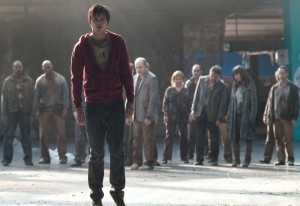The bodies get warmer
 This was pretty delightful. Great soundtrack, too.
This was pretty delightful. Great soundtrack, too.
This winter, two of my students are writing research papers on why zombies are such a popular topic in media culture. And what they’ve taught me is that, while horror trends come and go for all sorts of reasons, zombies stories, with their mindless mobs chasing lone survivors, tend to reference cultural anxieties about pending invasions; for much of second half of the 20th century, it was about the Cold War, and since then it’s been about the fear of some mixture of globalism and out-of-control viruses. Even when the zombie story is very well done – the remake of Dawn of the Dead, or 28 Days Later, or The Walking Dead – dread and hopelessness are so central to that plot that I become unnerved. So badly, in fact, that I walked out of Dawn of the Dead and stopping watch The Walking Dead after the first season. But hope and love are the central themes in the zombie romance Warm Bodies, and that is why I liked it so much.
The first seconds of Warm Bodies announces how different it is from almost every other zombie story. It begins with a zombified young man (Nicholas Hoult) wandering through an airport full of other hunched, shuffling dead people, and, shockingly, the young man has a witty, articulate voice over. This zombie can think and feel and hope and be bored, but he cannot remember much about himself other than that his name begins with the letter R. We quickly find out that that the zombie apocalypse had started eight years ago, that it was viral, and there was one remaining walled enclave of the living. Run by General Grigio (John Malkovich), the city manages to survive by sending out small teams of scavengers to bring back medical and other supplies. On one such mission, the general’s daughter Julie (Teresa Palmer) and her friends are attacked by R and his compatriots. R may be able to think and feel, but he still has to eat human flesh. In comparison to the zombies who are so far gone they just look like fleshy skeletons, “At least I feel conflicted about it.”
When R kills and eats the brains of Julie’s boyfriend Perry (Dave Franco), he gains all of Perry’s memories. So, when he sees Julie, he suddenly wants to protect her. To do so, he smears some blood on her, and hides her in plain sight among the other zombies, dragging her back to the airport, and keeping her holed up in a plane that he had filled with tchotchkes and vinyl records. To her great surprise, R can talk. He is also in love with her, and tries, despite his decayed flesh and minimal vocabulary and desire to eat human brains, to court her. In doing so, Julie discovers that the zombies are not hopeless or beyond help. Trying to convince her father of this, however, proves problematic. Trying to convince the remorseless skeletons… well, no one bothers to try that.
Warm Bodies is very loosely based on Romeo and Juliet. The star-crossed lovers are named R and Julie, Julie’s best friend wants to be nurse, R’s is named M and is clearly Mercutio, the living are the Capulets and the zombies are the Montagues. There’s even a balcony scene. Thankfully, the film, which is as funny as it is thrilling (meaning that it is moderately funny and moderately thrilling), is not a tragedy. Rather, it has a core of sweetness and optimism underneath the guns and brain tartare.
As R, Hoult, best known as the Beast in the new X-Men movies, is convincing as both a zombie and a romantic lead, which is no small chore. He has the youthful beauty of a teen matinee idol. Teresa Palmer is Kristen Stewart with more flesh and much more talent, doing both hardened survivor and goofy teen with convincing conviction. The star, I think, is director Jonathan Levine, who expertly adapted Isaac Marion’s 2011 novel, creating a wonderful and weird date movie that leaves you less anxious than you might have been before.
Warm Bodies
Written and Directed by Jonathan Levine
Starring Nicholas Hoult, Teresa Palmer, and John Malkovich
Rated PG-13
At your local multiplex